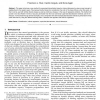Free Online Productivity Tools
i2Speak
i2Symbol
i2OCR
iTex2Img
iWeb2Print
iWeb2Shot
i2Type
iPdf2Split
iPdf2Merge
i2Bopomofo
i2Arabic
i2Style
i2Image
i2PDF
iLatex2Rtf
Sci2ools
114
click to vote
TKDE
2008
2008
IDD: A Supervised Interval Distance-Based Method for Discretization
This paper introduces a new method for supervised discretization based on interval distances by using a novel concept of neighborhood in the target's space. The proposed method takes into consideration the order of the class attribute, when this exists, so that it can be used with ordinal discrete classes as well as continuous classes, in the case of regression problems. The method has proved to be very efficient in terms of accuracy and faster than the most commonly supervised discretization methods used in the literature. It is illustrated through several examples, and a comparison with other standard discretization methods is performed for three public data sets by using two different learning tasks: a decision tree algorithm and SVM for regression.
Commonly Supervised Discretization | Discretization Methods | Ordinal Discrete Classes | TKDE 2008 |
Related Content
| Added | 15 Dec 2010 |
| Updated | 15 Dec 2010 |
| Type | Journal |
| Year | 2008 |
| Where | TKDE |
| Authors | Francisco J. Ruiz, Cecilio Angulo, Núria Agell |
Comments (0)

